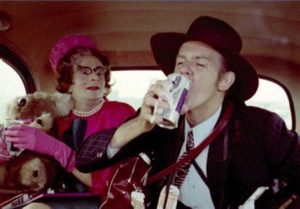
If the English language were a person, it would surely be a hoarder. I can see him holed up in a dank flat poring over words he found in the gutter, covered in foreign lice.
There is so much regional variation in our language it is a wonder we understand each other at all. Though what interests me most is when words diverge into two paths, often close enough to be confused, and why so many of these words are so very naughty.
Some words have changed meaning sufficiently to be more than a little embarrassing. For example, in Australia, an eraser is called a rubber and a condom is not. So when I shyly walked to the front of my Grade 4 class and asked my brand new Canadian teacher for a rubber, I watched her struggle to offer sex education to a nine-year-old. Apparently, my frantic erasing motions did nothing to bridge the definition gulf.
I’ve been stateside for years, but I still giggle when someone tells me they are rooting for their football team, which means to have sex with.
Arguably the only laugh to be had watching the The Nanny was in the theme song, when she was “out on her fanny,” which where I come from is – well, where I came from.
In the UK, fanny is both female genitals and a not unpopular girl’s name. How english is able to gracefully hold both meanings at once is a testament to its flexibility.
Spunk is another dirty word with a fascinating history. Etymologists say the term meaning pluck or confidence comes from the Gaelic word sponk; a form of fungus that was good for lighting fires. So someone with a bit of spark might be spunky.
In Australia, a spunk is a very good-looking person, especially a bloke, and if you’re really keen you might go as far as to say he is a spunk rat. By that measure, Press Gang-era Dexter Fletcher (pictured above) is most certainly a spunk rat. Though I daresay the term is not used much outside the island nation (or, in fact, outside the early 1990s.)
There is one other definition for the word spunk but I shall leave that to the Urban Dictionary to define. It does share its root with the fungus definition, however, and you can read into that what you will.
The stories in our words
A few months ago, I Americanized my website. It was more difficult and painful than I had expected. While it was a necessary step for me to build an audience in my new country, I resolved to keep as much of my Australianess as I thought I could get away with. It is, after all, part of me.

My fiancé (speaking of spunk rats) is a well-read Austraphile and knows me well but sometimes I spout a piece of Australian vernacular so bizarre it stops him in his tracks. I’m no Barry McKenzie (pictured above with an early incarnation of Dame Edna) but I do cherish the idiom woven through everyday Australian phrases. We carry stories in our words.
I once worked with a journalist who spoke almost exclusively in rhyming slang – a Queensland variant that frequently referenced only Australian vernacular. So when he said he was going to the rub-a-dub for a Ray, you knew he was probably out to full a tanned boot. To decifer that, you would need to know that a rub-a-dub stood in for pub, Ray was short for Australian TV legend Ray Martin, which rhymes with carton (of beer) and that to “full a tanned boot” was a particularly demeaning rhyme for pull a root, or to find someone to have sex with. To decifer that, you either need a linguistics degree or to have lived in rural Australia.
The expression “back of Bourke” means outback, or “a long way past civilization” but the expression springs from an actual place, past which you don’t want to drive without a spare tank of gas and a satellite phone. I’ve always loved the expression because it assumes the land is pointed only one way – toward settlement – and its back is turned to the dry interior, or what we Australians once called the “dead heart.”
One of my favorite story-laced expressions is the term sweet Fanny Adams, meaning nothing. Poor Fanny was a girl whose murder and dismembering made gruesome headlines in England in 1867. Apparently, around this time, sailors served unpalatable mutton from tins started referring to it as “sweet Fanny Adams”, which in turn came to mean “nothing good.”
(Interestingly, most of my generation only knows the shortening sweet F A, which is assumed to mean sweet f*ck all.)
Author James Nicoll jokes: “English doesn’t borrow from other languages. English follows other languages down dark alleys, knocks them over and goes through their pockets for loose grammar.”
Maybe that’s true but it’s a charmingly eccentric language and I for one am happy it is a hoarder. In our word choice, we carry the places we have been. In our idioms, we carry the story if who we are.